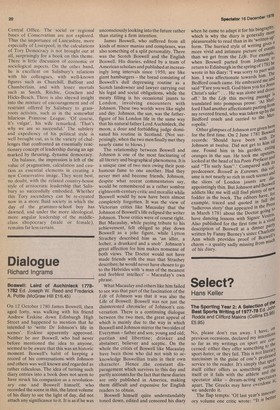Dialogue
Richard Ingrams
Boswell: Laird of Auchinieck 1 7781782 Ed. Joseph W. Reed and Frederick A. Pottle (McGraw Hill £16.45) On 12 October 1780 James Boswell, then aged forty, was walking with his friend Andrew Erskine down Edinburgh High Street and happened to mention that he intended to 'write Dr Johnson's life in scenes'. Erskine apparently approved. Neither he nor Boswell, who had never before mentioned the idea to anyone, seemed to be aware that this was an historic moment. Boswell's habit of keeping a record of his conversations. with Johnson and others was well known and regarded as rather ridiculous. The idea of turning such diary entries into a book does not seem to have struck his companion as a revolutionary one and Boswell himself, who recorded the scene in this, the latest volume of his diary to see the light of day, did not attach any significance to it. It is as if he was unconsciously looking into the future rather than stating a firm intention.
James Boswell, who suffered from all kinds of minor manias and complexes, was also something of a split personality. There was the Scotch Boswell and the English Boswell. His diaries, edited by a team of American scholars and published at increasingly long intervals since 1950, are like giant hamburgers — the bread consisting of Boswell's dull depressing routine as a Scotch landowner and lawyer carrying out his legal and social obligations, while the meaty filling is his occasional jaunts to London, involving encounters with Johnson. These two worlds were like night and day. Johnson, the sun, was the fatherfigure of his London life in the same way that his natural father Lord Auchinleck, the moon, a dour and forbidding judge dominated his routine in Scotland. (Not surprisingly, when the two men finally met they nearly came to blows.) The relationship between Boswell and Johnson is one of the most fascinating of all literary and biographical phenomena. It is a unique case of two men owing their posthumous fame to one another. Had they never met and become friends, Johnson, despite what recent commentators say, would be remembered as a rather sombre eighteenth-century critic and moralist while Boswell would by now have been almost completely forgotten. It was the view of Victorian critics like Macaulay that the Johnson of Boswell's life eclipsed the writer Johnson. Those critics were of course right. But Macaulay, while paying tribute to his achievement, felt obliged to play down Boswell as a joke figure, while Lytton Strachey described him as 'an idler, a lecher, a drunkard and a snob'. Johnson's great affection for him makes nonsense of both views. The Doctor would not have made friends with the man that Strachey describes; he would never have chosen to go to the Hebrides with 'a man of the meanest and feeblest intellect' — Macaulay's own phrase.
What Macaulay and others like him failed to see was that part of the fascination of the Life of Johnson was that it was also the Life of Boswell. Boswell was not just the disinterested chronicler of Johnson's conversation. There is a continuing dialogue between the two men, the great appeal of which is mainly due to the way in which Boswell and Johnson mirror the two sides of Everyman — father and son; young and old; puritan and libertine; drinker and abstainer; believer and sceptic. On the whole the critics of Boswell like Macaulay have been those who did not wish to acknowledge Boswellian traits in their own character. Hence the constant disparagement which survives to this day and partly accounts for the fact that these diaries are only published in America, making them difficult and expensive for English readers to obtain.
Boswell himself quite understandably toned down, edited and censored his diary when he came to adapt it for his biographY, which is why the diary is generally mute, pleasureable to read than in its 'written-11P form. The hurried style of writing gives! more vivid and intimate picture of eveTs than we get from the Life. For examPle, when Boswell parted from Johnson tu return to Edinburgh in the spring of 1781 .11! wrote in his diary: 'I was sorry to part vntil him. I was affectionate towards him. Ill Bedford coach came. He embraced me and said "Fare you well. God bless you for Jesus Christ's sake" . . . He was alone and drove off.' In the Life this moving passage Is translated into pompous prose: 'At ford! had another affectionate parting frn'"' my revered friend, who was taken up by the Bedford coach and carried to the Mel. ropolis.' Other glimpses of Johnson are given bere,1 for the first time. On 2 June 1781 Bc'sweu records: 'Should have been with plr, Johnson at twelve. Did not get to WI one. Found him in his garden, eat!fig oranges in the sun. He took me uPstairsj looked at the head of his Poets Prefaces and said "Tis surly Sam".' Compared with Is predecessor, Boswell in Extremes, this If°, ume is not nearly so rich in such scenes and the slices of London jaunts are disappointingly thin. But Johnson and Boswe addicts like me will still find plenty of neW fodder in the book. The editors have, fur example, traced and quoted in full the 'ludicrous story' that appeared in the Pre" in March 1781 about the Doctor going to have dancing lessons with Signor Vest'''. .5dAlso published for the first time is 3 description of Boswell at a dinner Pa"') written by Fanny Burney's sister Charlotte Ann which provides proof of Boswells charm — a quality sadly missing from Ow' of his diary.
milim■■•=0010.111.111.


































 Previous page
Previous page